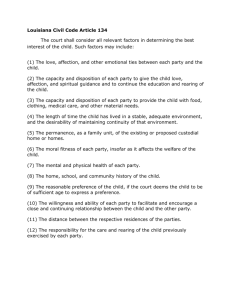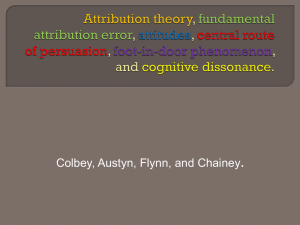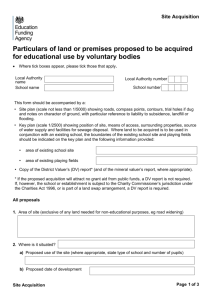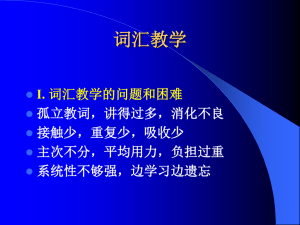Policy and Procedures: ANIMAL ACQUISTION AND DISPOSITION
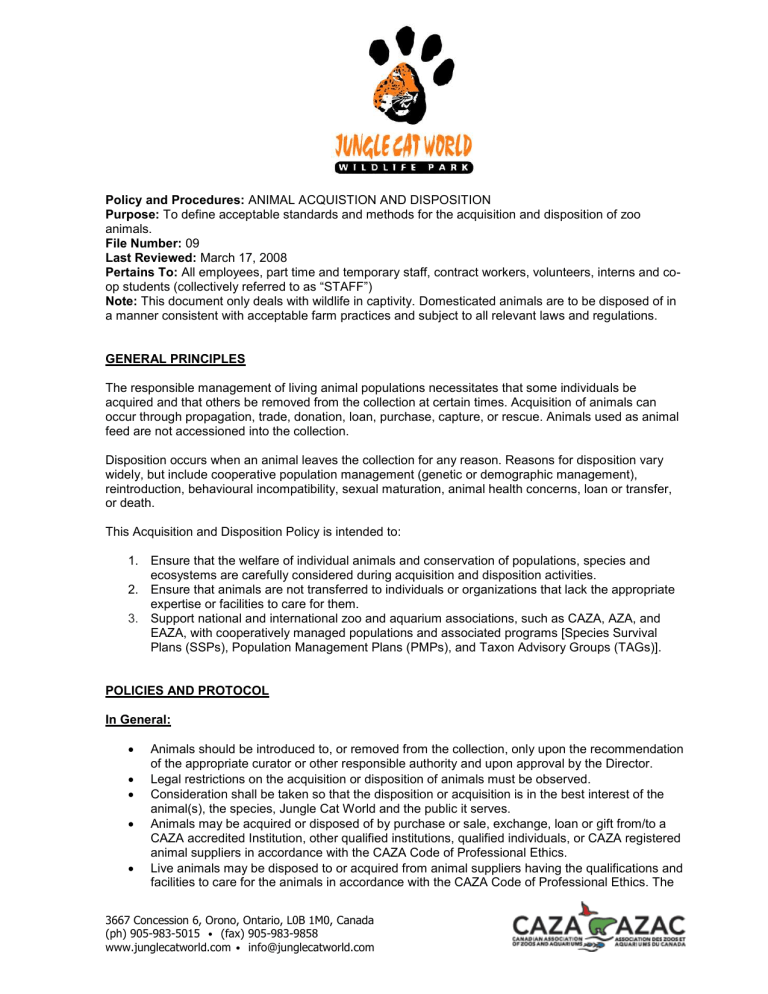
Policy and Procedures: ANIMAL ACQUISTION AND DISPOSITION
Purpose: To define acceptable standards and methods for the acquisition and disposition of zoo animals.
File Number: 09
Last Reviewed: March 17, 2008
Pertains To: All employees, part time and temporary staff, contract workers, volunteers, interns and coop students (collectively referred to as “STAFF”)
Note: This document only deals with wildlife in captivity. Domesticated animals are to be disposed of in a manner consistent with acceptable farm practices and subject to all relevant laws and regulations.
GENERAL PRINCIPLES
The responsible management of living animal populations necessitates that some individuals be acquired and that others be removed from the collection at certain times. Acquisition of animals can occur through propagation, trade, donation, loan, purchase, capture, or rescue. Animals used as animal feed are not accessioned into the collection.
Disposition occurs when an animal leaves the collection for any reason. Reasons for disposition vary widely, but include cooperative population management (genetic or demographic management), reintroduction, behavioural incompatibility, sexual maturation, animal health concerns, loan or transfer, or death.
This Acquisition and Disposition Policy is intended to:
1. Ensure that the welfare of individual animals and conservation of populations, species and ecosystems are carefully considered during acquisition and disposition activities.
2. Ensure that animals are not transferred to individuals or organizations that lack the appropriate expertise or facilities to care for them.
3. Support national and international zoo and aquarium associations, such as CAZA, AZA, and
EAZA, with cooperatively managed populations and associated programs [Species Survival
Plans (SSPs), Population Management Plans (PMPs), and Taxon Advisory Groups (TAGs)].
POLICIES AND PROTOCOL
In General:
Animals should be introduced to, or removed from the collection, only upon the recommendation of the appropriate curator or other responsible authority and upon approval by the Director.
Legal restrictions on the acquisition or disposition of animals must be observed.
Consideration shall be taken so that the disposition or acquisition is in the best interest of the animal(s), the species, Jungle Cat World and the public it serves.
Animals may be acquired or disposed of by purchase or sale, exchange, loan or gift from/to a
CAZA accredited Institution, other qualified institutions, qualified individuals, or CAZA registered animal suppliers in accordance with the CAZA Code of Professional Ethics.
Live animals may be disposed to or acquired from animal suppliers having the qualifications and facilities to care for the animals in accordance with the CAZA Code of Professional Ethics. The
3667 Concession 6, Orono, Ontario, L0B 1M0, Canada
(ph) 905-983-5015
•
(fax) 905-983-9858 www.junglecatworld.com • info@junglecatworld.com
source from which the suppliers have obtained the animals must be acceptable within CAZA guidelines. Similarly, the ultimate destination of animals sent to suppliers must be disclosed and approved before animals are sent to them.
Live or dead animals may be disposed of to a research project whose protocol has been approved by the Canadian Council on Animal Care or the equivalent.
Acquisition:
Prior to acquisition, it is imperative that the necessary resources are available to support and provide the professional care and management of the animal(s), so that the physical and social needs of both specimen and species are met.
Live animals may be acquired from research facilities.
Animals may be captured in the wild subject to relevant laws and regulations. The need to occasionally introduce new genetic stocks into a captive population is well documented. Threat to the survival of certain species may justify capture for captive breeding programs.
Disposition
A medical history, normal diet and a management/husbandry summary must accompany or precede an animal relocation.
Suitable live animals may be released into their native ranges or other areas according to relevant laws and regulations and to the general health of the specimen.
Animals will not be sold, traded or otherwise transferred to any organization or individual for the purpose of being hunted.
Non-domesticated animals shall not be disposed of at animal auctions. Additionally, animals shall not be disposed of to any organization or individual that may use or sell the animal at an animal auction.
It is the obligation of every loaning institution to monitor, at least annually, the conditions of any loaned specimens and the ability of the recipient to provide proper care. If the conditions and care of animals are in violation of the loan agreement, it is the obligation of the loaning institution to recall the animal.
Animals may be humanely euthanized if other modes of relocation are not feasible or desirable.
DISPOSITION OF ANIMALS TO PRIVATE OR NON-ACCREDITED INSITUTIONS
Private individuals or non-accredited institutions that are willing to accept and house surplus animals from Jungle Cat World, must sign an agreement form that requires the recipient to adhere to the CAZA
Code of Professional Ethics, the Animal Acquisition/Disposition Policy and other applicable CAZA guidelines, rules and standards. The contents of the agreement shall address:
The purpose of acquisition: propagation, education, research, display, other.
How does the facility/individual qualify to have the acquisition?
A detailed description and sketch or photograph of the housing facilities for the animal being acquired and all management protocols.
Copies of all necessary permits or licenses to possess the species.
A recommendation from a representative of at least one CAZA facility and/or appropriate
3667 Concession 6, Orono, Ontario, L0B 1M0, Canada
(ph) 905-983-5015
•
(fax) 905-983-9858 www.junglecatworld.com • info@junglecatworld.com
alternate
Provision that the animals in question might have to be returned or re-housed should accommodation or husbandry proves to be unworkable or inappropriate.
A signed statement stipulating that the recipient will comply with the above, and that they are in compliance with the applicable laws and regulations of local, provincial, federal and international authorities. This agreement must be kept on file and made available to the Accreditation inspection committee or to the Ethics Committee if requested.
DEAD SPECIMENS
The following considerations and requirements must be adhered to when dealing with the disposal of a deceased specimen, which includes animal parts and samples:
Dispositions of dead specimens must meet the requirements of all applicable local, provincial, federal and international regulations and laws.
Maximum utilization is to be made of the remains, which could include use in educational programs or exhibits.
Consideration is given to scientific projects that provide data for species management and/or conservation.
Records (including ownership information) are to be kept on all dispositions, including animal body parts, when possible.
SSP and TAG necropsy protocols are to be accommodated insofar as possible.
For personal reasons, the Director or staff may request that the deceased animal be interred at
Havelberg Pet Cemetery. Specimen details and the location of the burial site must be recorded.
REFERENCES
Peter Klose, Director, Safari Zoo Camp
CAZA Policy Re: Animal acquisition and disposition http://www.caza.ca/media/Pdf/Policies/Oct_15_2007_policy_on_Animal_Acquistion_eng.pdf
Association of Zoos and Aquariums: Acquisition and Disposition Policy http://www.aza.org/AboutAZA/ADPolicy/
3667 Concession 6, Orono, Ontario, L0B 1M0, Canada
(ph) 905-983-5015
•
(fax) 905-983-9858 www.junglecatworld.com • info@junglecatworld.com
